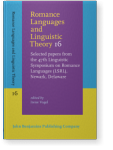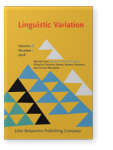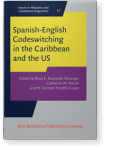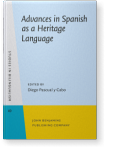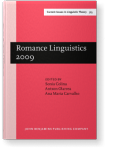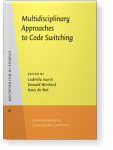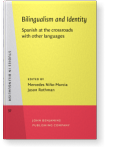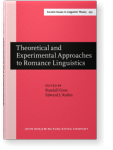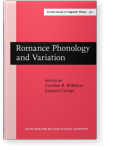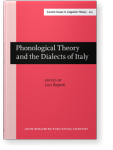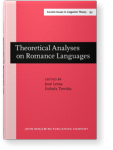Barbara E. Bullock
List of John Benjamins publications for which Barbara E. Bullock plays a role.
Book series
Title
Formal Perspectives on Romance Linguistics: Selected papers from the 28th Linguistic Symposium on Romance Languages (LSRL XXVIII), University Park, 16–19 April 1998
Edited by Jean-Marc Authier, Barbara E. Bullock and Lisa A. Reed
[Current Issues in Linguistic Theory, 185] 1999. xii, 334 pp.
Subjects Generative linguistics | Phonology | Romance linguistics | Syntax
2018 The challenges and benefits of annotating oral bilingual corpora: The Spanish in Texas Corpus Project Romance Parsed Corpora, Tortora, Christina, Beatrice Santorini and Frances Blanchette (eds.), pp. 100–119 | Article
This article describes efforts to collect, process, and automatically annotate a corpus of Spanish as spoken in Texas. It elaborates the protocols for the development of the corpus and the procedures for automatic annotation, illustrating the common pitfalls to language identification in… read more
2017 Chapter 11. Return to Frenchville: Tracing a near-merger from legacy data Romance Languages and Linguistic Theory 11: Selected papers from the 44th Linguistic Symposium on Romance Languages (LSRL), London, Ontario, Perpiñán, Silvia, David Heap, Itziri Moreno-Villamar and Adriana Soto-Corominas (eds.), pp. 229–246 | Chapter
This study investigates a potential case of near-merger in legacy French data from Frenchville, Pennsylvania. With previous research having found a robust differentiation in production between French schwa and the front mid rounded vowels by the final generation of Frenchville French speakers, we… read more
2016 The stratification of English-language lone-word and multi-word material in Puerto Rican Spanish-language press outlets: A computational approach Spanish-English Codeswitching in the Caribbean and the US, Guzzardo Tamargo, Rosa E., Catherine M. Mazak and M. Carmen Parafita Couto (eds.), pp. 171–189 | Article
This chapter considers the presence of English in a 3.3-million-word corpus of Puerto Rican news press addressed to distinct social classes: El Vocero, published for a working-class population, El Nuevo Día for a mainstream market, and 80grados for an intellectual readership. Statistical models… read more
2016 A new look at heritage Spanish and its speakers Advances in Spanish as a Heritage Language, Pascual y Cabo, Diego (ed.), pp. 27–50 | Article
In this chapter we advocate for the value of new forms of observation for characterizing the Spanish of heritage speakers in the United States. As is widely recognized, Spanish acquired in bilingual contexts is different from Spanish acquired in monolingual settings; and, yet, the nature of… read more
2015 An experimental approach to hypercorrection in Dominican Spanish Hispanic Linguistics at the Crossroads: Theoretical linguistics, language acquisition and language contact, Klassen, Rachel, Juana M. Liceras and Elena Valenzuela (eds.), pp. 251–268 | Article
A stigmatized trait of popular Dominican Spanish is the insertion of pre-consonantal or final [s] into a lexical item (e.g. Ja[s]queline). The predominant explanation among phonologists for this uniquely Dominican phenomenon is that the uneducated are ‘lost-s’ speakers who do not know which words… read more
2010 Correcting the record on Dominican [s]-hypercorrection Romance Linguistics 2009: Selected papers from the 39th Linguistic Symposium on Romance Languages (LSRL), Tucson, Arizona, March 2009, Colina, Sonia, Antxon Olarrea and Ana Maria Carvalho (eds.), pp. 15–24 | Article
Theoretical linguistic treatments of Dominican [s]-hypercorrection all assume the hypotheses, advanced by Terrell (1986), that lexical forms in popular Dominican Spanish no longer contain any trace of coda or final /s/ and, thus, speakers randomly insert them into syllable- and word-final position… read more
2009 8. Trying to hit a moving target: On the sociophonetics of code-switching Multidisciplinary Approaches to Code Switching, Isurin, Ludmila, Donald Winford and Kees de Bot (eds.), pp. 189–206 | Article
2008 8. Kreyol incursions into Dominican Spanish: The perception of Haitianized speech among Dominicans Bilingualism and Identity: Spanish at the crossroads with other languages, Niño-Murcia, Mercedes and Jason Rothman (eds.), pp. 175–198 | Article
2006 Intra-System Variability and Change in Nominal and Verbal Morphology Historical Romance Linguistics: Retrospective and perspectives, Gess, Randall and Deborah Arteaga (eds.), pp. 305–325 | Chapter
2006 Mapping the Patterns of Maintenance versus Merger in Bilingual Phonology: The Preservation of [a] vs. [ɑ] in Frenchville French New Perspectives on Romance Linguistics: Vol. II: Phonetics, Phonology and Dialectology, Montreuil, Jean-Pierre Y. (ed.), pp. 15–29 | Article
This acoustic investigation focuses on the preservation of the two low French vowels /a/ vs. /ɑ/ within a vowel system that otherwise manifests striking convergent properties with English. Our acoustic data demonstrate that this inherited contrast is preserved, with a distribution largely… read more
2005 Perseverative Phonetic Effects in Bilingual Code-Switching Theoretical and Experimental Approaches to Romance Linguistics: Selected papers from the 34th Linguistic Symposium on Romance Languages (LSRL), Salt Lake City, March 2004, Gess, Randall and Edward J. Rubin (eds.), pp. 291–306 | Article
2003 Analogy as a Learning tool in Second Language Acquisition: The Case of Spanish Stress Romance Linguistics: Theory and Acquisition, Pérez-Leroux, Ana Teresa and Yves Roberge (eds.), pp. 281–297 | Article
2002 Constraining the vagaries of glide distribution in varieties of French Romance Phonology and Variation: Selected papers from the 30th Linguistic Symposium on Romance Languages, Gainesville, Florida, February 2000, Wiltshire, Caroline R. and Joaquim Camps (eds.), pp. 11–25 | Article
2000 Consonant Gemination in Neapolitan Phonological Theory and the Dialects of Italy, Repetti, Lori (ed.), pp. 45 ff. | Article
1999 Formal Perspectives on Romance Linguistics Formal Perspectives on Romance Linguistics: Selected papers from the 28th Linguistic Symposium on Romance Languages (LSRL XXVIII), University Park, 16–19 April 1998, Authier, Jean-Marc, Barbara E. Bullock and Lisa A. Reed (eds.), pp. 1 ff. | Article
1998 The myth of equivalence: Where two lights do not make a long Theoretical Analyses on Romance Languages: Selected papers from the 26th Linguistic Symposium on Romance Languages (LSRL XXVI), Mexico City, 28–30 March, 1996, Lema, José and Esthela Treviño (eds.), pp. 53 ff. | Article
